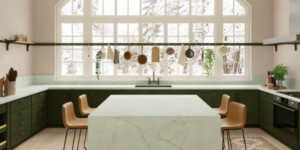What you need to know about porcelain countertops
Porcelain countertops are a popular choice for kitchen and bathroom surfaces due to their durability, versatility, and aesthetic appeal. Here are some key points to consider about porcelain countertops:
1. Material Composition:
– Porcelain Tile: Porcelain countertops are often made from large porcelain tiles. These tiles are composed of clay, feldspar, and other minerals. They are fired at high temperatures, which makes them dense and less porous compared to other types of ceramic tiles. At AMC Countertops, we use large porcelain slabs for a more seamless look.
2. Durability:
– Porcelain countertops are known for their durability and resistance to wear and tear. They are highly resistant to scratches, stains, and heat. This makes them suitable for high-traffic areas in the kitchen.
3. Water Resistance:
– Porcelain is inherently water-resistant, making it an excellent choice for bathroom countertops. Its low porosity prevents water absorption, reducing the risk of mold and mildew growth.
4. Stain Resistance:
– Porcelain countertops have a non-porous surface, making them resistant to stains from liquids such as wine, coffee, and oil. This ease of cleaning and stain resistance is a significant advantage in kitchen settings.
5. Heat Resistance:
– Porcelain countertops can withstand high temperatures, but it’s still advisable to use trivets or hot pads to protect the surface from extreme heat. Rapid changes in temperature, such as placing a hot pan directly on a cold porcelain surface, may cause stress and potential damage.
6. Design Options:
– Porcelain countertops come in a wide range of colors, patterns, and finishes, including designs that mimic the appearance of natural stone like marble or granite. This variety allows homeowners to achieve different aesthetic preferences.
7. Installation:
– Installation of porcelain countertops can be more complex than other materials. It’s essential to hire a professional installer familiar with working with large porcelain tiles to ensure a proper and secure installation.
8. Thickness:
– Porcelain countertops are available in various thicknesses, typically ranging from 6mm to 20mm. Thicker slabs may be more suitable for certain applications, such as kitchen countertops, where additional strength is required.
9. Cost:
– Porcelain countertops can be more expensive than some other materials, but the durability and longevity they offer can justify the initial investment. Additionally, their low maintenance requirements can result in long-term cost savings.
10. Maintenance:
– Porcelain countertops are relatively low-maintenance. Regular cleaning with mild, non-abrasive cleaners is usually sufficient. As they are non-porous, sealing is not required.
It’s essential to consider your specific needs, budget, and design preferences when choosing a countertop material. Porcelain countertops are a viable option for those seeking a durable and aesthetically pleasing surface with minimal maintenance requirements.
